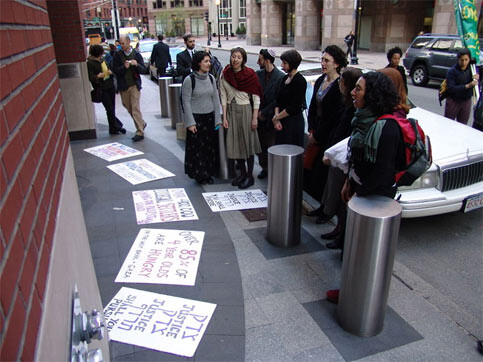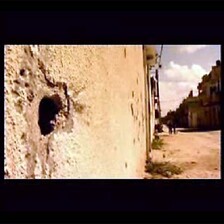The Electronic Intifada 17 April 2006

Passover demonstration on April 11th 2006, downtown Boston. (Photo: Jonathan McIntosh)
On Tuesday, April 11, at 5:00 pm, 20 young Jewish people gathered for a seder (traditional celebration of Passover) outside 126 High Street in Boston, the building that houses the American Israel Public Affairs Committee (AIPAC) and Boston’s Jewish Community Relations Council (JCRC). The group expressed their support for Palestinian human rights and opposition to AIPAC’s and JCRC’s unquestioning support for Israel and its governmental policies. With a banner that read “Passover means liberation for all. Justice for Palestine,” they conveyed the message to the organizations inside and to the media that AIPAC and JCRC do not speak for all Jews.
The group set up a seder table and recited Passover’s traditional four questions, one of the many ways the story of Exodus is told during Passover. The four questions include symbols and explanations for why we use these symbols during the holiday. The group’s explanations included facts about Israel’s demolition of Palestinian homes, confiscation and destruction of Palestine’s land resources for the expansion of settlements and the Separation Wall, and malnutrition and poverty in Palestine caused by Israeli closure and movement restrictions.
According to Marjorie Kent, one of the organizers of the seder, “During Passover, every generation of Jewish people is commanded to remember that we were slaves and to tell the story of the Exodus so that we can recognize oppression that happens today and work to stop it. Today we committed ourselves to this task.”
AIPAC pushes the US government to support Israeli policies which result in the brutal oppression of Palestinian people and denial of their internationally recognized human rights. JCRC, while claiming to speak for all Jews, invests enormous time and energy suppressing any voice of opposition to Israeli policies, especially Jewish voices. “Our generation has had enough of AIPAC’s and JCRC’s complicity in Israel’s human rights abuses of Palestinians,” said Hannah Mermelstein, another seder organizer. “Their support of these policies betray the libratory message of Passover.”
Not everyone agreed. One man walked briskly past the group and screamed, “Race traitors! Religion traitors! I am a proud Jew and will not give my homeland to the Arabs.” Other passersby stopped to watch or ask questions. Most people leaving the building did not engage with the group, but clearly knew why the group was there.

Passover demonstration on April 11th 2006, downtown Boston. (Photo: Jonathan McIntosh)
The group called on people leaving the building to take the message of “liberation for all” home with them this Passover. They handed out supplements for people to add to their traditional Passover seders. The final question of the four, traditionally asking why we recline instead of sitting straight in our chairs, asked instead: “On Passover, we usually sit on soft chairs. Why do we stand at this seder?” The answer: “Avadot hayinu. We were slaves. Because this year, it is time for each of us to make a choice. Do we stand for justice? Or do we sit and do nothing as others are oppressed in our name? Do we stand against the oppression of our Palestinian sisters and brothers? Or do we sit and allow AIPAC, JCRC, and others to betray our traditions? Do we act in the true spirit of Passover, or do we remain silent and betray the meaning of our sacred tradition? Today, we choose to stand!”
As the group left, the police arrived with specific instructions to arrest them. An officer said to one member of the group, “Thank you for not making us arrest you just before Easter.”
Hannah Mermelstein is a member of the International Women’s Peace Service and co-founder of Birthright Unplugged. Originally from the Philadelphia area, she now lives part-time in Boston and part-time in Palestine.





